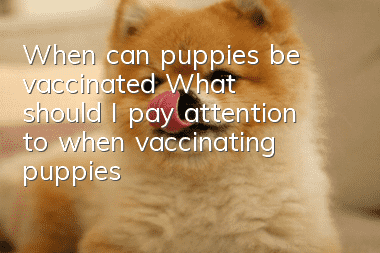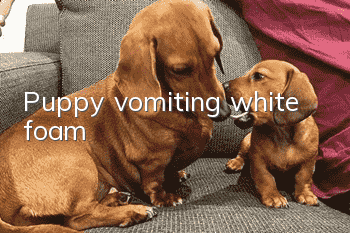When can puppies be vaccinated? What should I pay attention to when vaccinating puppies?

When should a dog get its first vaccination?
Puppies require three vaccinations for their first immunization. The first dose is given 45 days after birth, the second dose is given 21 days apart, and the third dose and rabies vaccine are given 21 days later. Thereafter, regular vaccinations will be given every eleven months.
Reason:
Dog babies acquire antibodies from breast milk after birth, and these antibodies have immune functions. It can be weaned after it grows to about 30 days. After weaning, this immunity will gradually disappear, and it needs to be provided with antibodies through vaccination.
Note:
1. Consult about vaccines: Before injection, you should consult a veterinarian to understand the content of the vaccine your pet is about to receive, including protective effects and allergic reactions. If you have ever been allergic to drugs or the brand of the vaccine manufacturer, you should also inform your doctor.
2. Adapt to the environment: When a new dog is just raised, even if the puppy is one month old, the first vaccine can be given. It is recommended to wait for the puppy to adapt to the environment and then give the vaccine after about 2 weeks to reduce the puppy's nervousness and allow the vaccine to have maximum effect. utility.
3. Good health: Before being vaccinated, the dog will undergo a full body examination. The injection should be given when the dog is in good health.
4. Injection during the day: If an allergy occurs after an injection during the day, you can seek medical treatment as soon as possible; if an injection is given at night, if the dog develops an allergy in the middle of the night, the golden time for treatment may be missed.
5. Hospital rest: After receiving the vaccine, it is recommended to stay in the veterinary hospital for about 30 minutes to rest. During this period, you can observe whether there is any allergic reaction. Most allergic reactions will appear within 30 minutes.
6. Observe allergies: Common symptoms of allergies include edema, such as facial swelling, most obvious in the eye sockets and lips. There may also be symptoms such as urticaria, red and itchy skin, vomiting, and diarrhea. In severe cases, there may be shortness of breath or even anaphylactic shock. .
7. Get enough rest: Do not stay outside for too long and avoid contact with other dogs.
8. Promote appetite: Some pets may have poor appetite after vaccination. In addition to daily food, you can add some canned food to stimulate their appetite and maintain a normal diet.
9. No bathing: It is not recommended to bathe 7 days after the injection, because bathing can easily catch a cold and reduce immunity; it can also easily cause the dog to become nervous and affect the effectiveness of the vaccine.
10. Hot compress lumps: Some pets may develop lumps due to insufficient massage under the skin and kneading the medicine after vaccination. You can help the pet apply hot compress and massage on the lump. If the lump does not disappear after 2 weeks, you should seek medical examination as soon as possible.
Injecting the vaccine into the body will cause the dog's resistance to decrease, and you can give it a bath after seven days.
If during this period the dogIf it is too dirty, you can also use dry cleaning to simply clean the dog.
- Why do dogs like to run wildly after taking a bath?
- Why does a dog sleep with his eyes open?
- Common ear canal diseases in dogs
- Why do dogs always lick their butts?
- What are the symptoms of calcium deficiency in dogs? Several ways to improve your dog’s calcium deficiency!
- Why do pet dogs eat grass? Pet owners who don’t know should not misunderstand!
- Can dogs often eat animal offal?
- How to teach a dog to defecate at designated spots?
- How to train a dog to shake hands?
- Things to note when caring for an old dog



